Newsletter August 2022
Events |
|
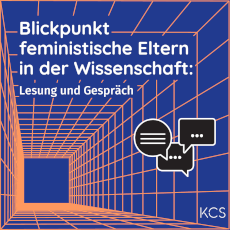
|
Focus on feminist parents in science: reading and conversation I September 5, online
With Alicia Schlender, Lisa Yashodhara Haller, Sarah Czerney and Lena Eckert A break in life: Being a scientist - becoming a mother. This is how Sarah Czerney, Lena Eckert and many other authors describe it in the anthology "Mutterschaft und Wissenschaft. The (In)compatibility of Motherhood and Scientific Activity." In very personal texts, the authors process their experiences as scientists, as mothers, and as those who are intentionally or unintentionally childless. The contributions take a look from different directions at the challenges (expectant) mothers face when they also work as scientists, and how these are shaped structurally. In their publication, Alicia Schlender and Lisa Yashodhara Haller bring together equally diverse perspectives on the complex of parenthood. Not only different personal perspectives are presented, but also theoretical approaches that are mainly dedicated to feminist parenting. The heteronormative nuclear family is expanded by feminist utopias of equal parenthood, queer family concepts and taboo topics such as depressed parents and miscarriages are addressed. In a joint discussion, the authors try to discover and develop similarities and differences in their texts. The visualization of motherhood, of parenthood comes to the fore: for networking, exchange and empowerment of mothers and feminist parents. Here, you can register for the event until September 2. |

|
We need to talk! - About antifeminism I September 7, online
An exchange about attacks on equality and self-determination and how we can counter them. Perhaps you are familiar from your everyday life or professional environment with assertions about the supposed equality of the sexes that has long since been achieved or about men who are actually the disadvantaged in this society. Perhaps you also encounter devaluations of people based on lived gender diversity, through e.g. hate comments in social media against lesbians, gays, bisexuals, inter*, trans* or non-binary people. You might have also encountered racist attributions towards people in this context. Behind such and many other statements are often anti-feminist, anti-democratic attitudes, ways of thinking, resentments and ideologies. But what exactly is antifeminism? What is behind so-called anti-gender movements? How do these affect our democracy? This online event offers you the opportunity to learn a bit more about the phenomenon of antifeminism and to discuss any questions you may have about it. With: Hannah Wagner, pro familia Frankfurt/M. Lisanne Heilmann, Queere Bildung e. V./soorum Hamburg Juliane Fischer-Rosendahl, BAG kommunale Frauen- und Gleichstellungsstellen and Equal Opportunities Officer in the Spandau District Office, Berlin Ans Hartmann, Hannah Beeck and Judith Rahner, Amadeu Antonio Foundation Laura Sasse, Sarah Klemm and Ulla Wittenzellner, Dissens - Institute for Education and Research Henning von Bargen and Sandra Ho, Gunda Werner Institute Introduction: What is "antifeminism"? Impulse lecture by speakers of the joint project "Countering Antifeminism - Strengthening Democracy". Antifeminism concretely: How and where do antifeminist attitudes express themselves? Moderated discussion by Wiebke Eltze Networking, Shaping, Acting: "Countering Anti-Feminism - Strengthening Democracy". Short presentation of the Democracy Live! project Conclusion The event is aimed at individuals, organizations and groups involved in civil society who are committed to democracy and an open society, as well as interested individuals who have not yet had much exposure to the phenomenon of antifeminism. For more information, please contact: |
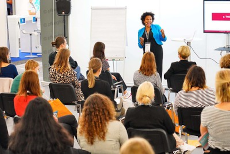
|
Reminder: hercareer I Oktober 6-7, Munich
On October 06 and 07 the herCAREER expo is going into the next round. For the seventh time, the career and networking fair for women will take place in Munich, this time at the MOC. The herCAREER addresses job starters, specialists and executives as well as founders. For further details check out their website. |
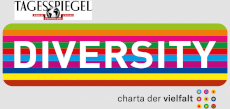
|
DIVERSITY 2022 I November 10-11, online
Freedom, Democracy, Self-Determination: Defending Values in Times of Crisis A joint event of Charta der Vielfalt e.V. and Der Tagesspiegel publishing house In times of crisis, it becomes particularly clear how precious freedom, democracy and self-determination are. Autocratic rulers and populists not only oppose the values of our political system, but also the appreciation of diversity, which is at the core of the work of diversity managers. How do we defend these values in times of populism, flight, wars and crises? How do we build bridges, how can we convince even doubters? The eleventh DIVERSITY conference shows: Diversity is not "decadent" - as the enemies of democracy claim. If managed wisely, it is the key to success in business and society - and to sustainable peace. For further details check out their website. |
Grants and prizes |
|
|
Two call openings: Starting Grants 2023 and Synergy Grants 2023
With the publication of the ERC Work Program 2023, two calls will also be opened: Applications for the 2023 Starting Grant Call can be submitted from July 12, 2022 to October 25, 2022. Starting Grants are aimed at young researchers with a PhD who wish to pursue their scientific independence and establish their own research group. With a planned budget of 628 million euros, 407 projects are to be funded. From July 13, 2022, to November 8, 2022, the call for Synergy Grants 2023 is open. Synergy Grant Groups consisting of two to four outstanding researchers and their teams are eligible to apply. A budget of 300 million euros will be made available for 30 projects. The ERC NCP is available to answer questions and provide advice, and will proofread applications. Please note the following binding deadlines for the last possible submission of your application to the NCP for review: October 4, 2022 (5pm) for Starting Grant applications; and October 18, 2022 (5pm) for Synergy Grant applications. Detailed information on both funding lines can be found in the ERC Work Programme 2023 and on the homepage of the ERC NCP. |
|
|
Information trip for female scientists to Brussels
On September 5 and 6, the Contact Point Women in EU Research (FiF) is again organizing a two-day information trip for female scientists. The target group is female scientists with doctorates in all disciplines at universities and other research institutions in Germany. |
|
Call for Papers |
|
|
Unbreakable patriarchy? Gender Hierarchy as an Object of educational Women's and Gender Studies I Deadline September 15
Annual Meeting of the Section for Women's and Gender Studies (DGfE) in 2023 at the University of Paderborn. Changing and persistent problems in gender relations repeatedly raise questions in women's and gender studies about the shape of these relations, their analysis and adequate description. Gender policies (as well as other changes in the economy, education, and the world of work) have advanced the equality of women and men and the multiplication of gender identities. Alongside public critiques of discrimination against women has been advocacy against trans, inter, and queer hostility. However, phenomena of inequality and violence have by no means disappeared, as shown by statistics on wealth distribution, sexual violence, and femicide (see Glammeier 2022; Kampshoff 2022). It remains to be seen whether the utopia of a "beyond patriarchal models" could be realized or how the current gender relations can be understood from the perspective of women's and gender studies in educational science. This raises the question of suitable conceptual instruments and theoretical concepts for the analysis of hierarchical gender relations. While the term patriarchy for the second women's movement referred to male domination in political, economic and sexual terms, the erosion of such gender relations under neoliberal conditions was already becoming apparent at that time. However, research on gender history (Opitz-Belakhal 2010) and from the perspective of Black Feminism (Kelly2018; Bergold-Caldwell 2020) and Migrant Feminism (Gutierrez Rodriguez/Tuzcu2021) had shown early on that a male-oriented gender hierarchy was and is always already fragile in time and space. This finding does not refute the existence of such a structure, but points to its repeated need for "resovereignization" (Forster 2006), because male supremacy is neither natural, universal, nor supratemporal. Against the backdrop of the development and discussion highlighted, the organisers invite to submit abstracts for their annual conference in March 2023. In addition to the usual format of the lecture, collective panels or sessions for joint consideration of selected material may also be proposed. In terms of content, contributions that approach the conference topic historically, theoretically, conceptually, and empirically are welcome. For example, contributions on the following topics are welcome: Abstracts of max. 2500 characters can be sent to the board members until September 15: christine.thon@uni-flensburg.de You can find the complete call here. Invitations will be sent in October 2022. |
|
|
Pedagogy and Gender as a Matter of Political Struggle: Analyzing Right-Wing, Anti-Feminist and Racist Discourses I Deadline September 30
International conference, Europa-Universität Flensburg, May 4 – 6, 2023 In their attempt to establish themselves in mainstream society, right-wing populist and Besides racist and antisemitic ideologies, these anti-democratic and right-wing politics consists in a specific reference to gender-political issues. In alliance with other antifeminist actors and movements (Hark/Villa 2015 (eds.); Lang/Peters 2018 (eds.)), gender-political issues such as gender mainstreaming or gender-sensitive language are attacked as “gender gaga". Sometimes gender is also taken as a reference for femonationalist (Farris 2017) politics that defines the fight against Islam or against immigration as a fight for women rights and one against violence against women and sometimes as the one and only "true" feminism (Dietze 2019; Bergold-Caldwell/Grubner 2020). At the same time, a pedagogy oriented towards gender and sexual diversity and especially its anchoring in school curricula is discredited as "early sexualization," "re-education," and endangering the well-being of children (Schminke 2015; Tuider 2016; Oldemeier et al. 2020; Grenz 2020; 2021). Besides a dynamic development in the field of right-wing, racist and antifeminist discourses on pedagogy and gender, these topics are also more often subject of research in various disciplines (e.g. Hechler/Stuve 2015 (eds.); Näser-Lather et al. 2019 (eds.); Henninger/Birsl 2020 (eds.); Dietze/Roth 2020 (eds.); Sehmer et al. 2021 (eds.); Strube et al. 2021 (eds.)). With the conference "Pedagogy and Gender as a Matter of Political Struggle: On the Analysis of Right-Wing, Anti-Feminist and Racist Discourses" we would like to create a forum for marking relevant research subjects, exchanging views on an evolving field of research, and networking among researchers and their projects. We invite submissions on the following sets of questions:
Contributions can take the form of a lecture as well as a poster and can be presented in both German and English. Abstracts of max. 2500 characters are requested to be sent to frauke.grenz@uni-flensburg.de You can find the call here. |
|
|
Déjà-vu? Gender, the Holocaust, and Subjectivation in Erinnerungskultur (Memory Culture) after 1945 I Deadline November 1
Especially for the post-war German society and the descendants of Nazi-perpetrators, the question of "who we are" was posed anew in many fundamental ways in the face of Nazi crimes. Within the framework of cultural representations of memory after 1945, attempts to decidedly answer the question, "What defines us?" have been in terms of sexuality and gender. Memory and memory culture are both inscribed with and interpreted through narratives of gender and sexuality. These narratives equally structure—but not in the same way—representations of survivors, perpetrators, as well as their respective descendants, or those who view themselves as their "heirs" in the field of memory culture. Such an afterlife of history has a subjectivizing effect: it is a key component in the emergence and visualization of gendered (collective) identities and the formation of certain subject positions within memory politics. When examining contemporary representations of National Socialism, violence, and gender, previously established patterns of representation seem to repeat themselves—patterns that have shaped and continue to shape the debates since 1945. The "already seen" (déjà vu) forces its way into current representations of National Socialism and the Holocaust. At the same time, the memory of the Nazi past remains a highly politicized field in which narratives of identity are highly contested and subject to frequent shifts. Debates about the politics of remembrance have recently received increased attention. However, issues of gender and sexuality are rarely raised and often left unaddressed. Recently, critical scholarship from Central and Eastern Europe, among others, has repeatedly pointed out how certain narratives of the past, but also gender-specific approaches, can be controversial in academic and public debates. So is the case, for example, when remembrance of the persecution and murder of sexual minorities, of the so-called "mentally ill" and "asocials", as well as of Sinti and Roma is confronted with state-sanctioned distortion and disinformation. Instances of indifference or explicit attempts of re-writing can sometimes even culminate in legal action against scholarship on minority perspectives, which fundamentally calls into question research freedom and integrity. Recently, such a gender-specific erasure shaped the debate on commemorating lesbian women at the Ravensbrück Memorial. In addition, representation of homosexual victims was omitted from the memorial site of the Stutthof Nazi concentration camp until very recently. The powerful order of discourses on memory culture adheres to an implicit hierarchy and often does not allow for equal articulation and/or representation whilst relegating some victimized groups to the margins. Such an intersectional perspective shows that practices of denial and marginalization correlate with being rendered invisible due to heteronormativity, ableism, antisemitism and/or racism. Thus, the question of what is "already seen", of recognizable shifts, and of possible impulses for other, hitherto underrepresented and/or marginalized narratives at the intersection of gender, the Holocaust, and subjectivation is the impetus behind this call for submissions. The planned issue is interested in contributions from the field of (audio-)visual culture within the thematic scope of (in-)official commemoration, exhibition display, cinematic and artistic representations, or from the broader context of digital history (e.g., in the medium of video games). The notion of déjà vu is understood less as "deception" or "illusion" but rather as repetition and reproduction, as well as textual and visual musealization of certain memory constructions. We connect the question of transmission and canonization with the question of possible ruptures and (de)stabilizations, of controversial shifts and unwanted attentions, and finally of their (subjectivizing) meaning for the respective memory communities. To what extent are known narratives of gender and sexuality reproduced in current representations of Nazi history and the Holocaust? Are there recognizable ruptures from traditional representations within more recent representations of National Socialism and the Holocaust? To what extent do gendered and sexualized representations of the Holocaust and the Nazi past have a subjectivizing effect on their recipients, on individuals and collectives? And how might their subjectivation change if the representations, and thus the offers for subject formation, shift? The publication will be peer-reviewed by the editors of FKW. The deadline for submissions is November 1st, 2022. Please send us an abstract of no more than 3,500 characters as well as a short CV to FKW73@gmx.net. You can find the call here. |
|
News in gender research |
|

|
10th German Diversity Day – recap and numbers
According to the organizers, Diversity Day was a great success: 1100 organizations organized more than 3000 activities took place. You can find more information such as participant numbers and media response here in the presentation. |
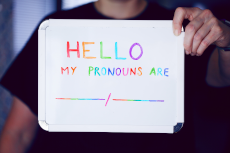
|
Study on the "Living Situation of lsbtiq* Persons in Saxony"
On June 22, 2022, the Saxon State Ministry of Justice and for Democracy, Europe and Equality (SMJusDEG) published the study "Lebenslagen von Isbtiq* Persons in Sachsen." The study explores for the first time specifically for Saxony the living situations of lesbian, gay, bisexual, trans*gender, intergender, non-binary and queer (lsbtiq queer (lsbtiq*) people and shows their diversity, quality of life and experiences. Approximately 1500 people participated in the online survey. In addition, a structural analysis of the offers in Saxony in the area of gender and sexual diversity was carried out. The study is the basis for the further development of the state action plan for the acceptance of the diversity of lifestyles. Further information and the entire study can be downloaded from the website of the Free State of Saxony. |

|
Gender Trouble and theology
Claudia Willms reviews the 2020 anthology Judith Butler und die Theologie. The book, edited by Bernhard Grümme, professor of religious education, and Gunda Werner, professor of dogmatics, sheds light on the theological reception of Butler's philosophy. The article Theologisches Neuland oder: der religiöse Horizont des Butler‘schen Denkens can be found on gender-blog. |
University and politics |
|
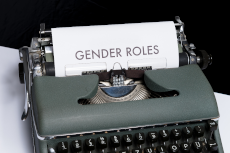
|
Conference of Saxon student bodies unanimously adopts resolution on Gender Inclusivity
At the end of May 2022, the KSS Saxony unanimously adopted its positions and requirements for a gender-inclusive university in Saxony, with no dissenting voices or abstentions. In it, it advocates the use of gender-equal language that must not exclude special characters, individual self-determination of names and gender in the master databases of universities, and the establishment of gender-neutral sanitary facilities, and also cites positive examples of the Saxon university landscape. You can read the press release here. |

|
Colon or asterisk? On the question of the barrier-friendliness of gender-sensitive language
The bukof (Bundeskonferenz der Frauen- und Gleichstellungsbeauftragten an Hochschulen e.V) recommends the use of the gender asterisk for barrier-free and gender-sensitive language. Gender diversity is increasingly made visible in spoken and written language in a sensitive, inclusive and accurate way. The gender asterisk has replaced binary variants, as well as the underscore. At the same time, the colon has recently been gaining a lot of traction in higher education and academia. It can be found in resolutions on gender-sensitive language by institutions, in social networks, work emails, and even in advertising and cover letters from companies. In their statement, the bukof welcomes a stronger social anchoring of gender-sensitive language. However, they are critical of the use of the colon. You can find the complete statement here. |

|
Joint Statement on the WissZeitVG - Plea for a Reform of the Law on Fixed-Term Contracts
Additionnally, Bukof has issued a joint statement concerning the Wissenschafts-zeitvertragsgesetz together with the German Trade Union Federation (DGB), the Education and Science Union (GEW), the Helmholtz Juniors Network of PhD students of the Helmholtz Association Leibniz, the PhD Network Network of PhD students of the Leibniz Association, the NGAWiss Network for Good Work in Science, the United Services Union (ver.di) and respect science Association for New Incentives in Science. In it, the following is demanded: "The concept of qualification must be narrowly defined and the duration of the contract for doctoral students must correspond at least to the average duration of the doctorate in the specific subject. After completion of the doctorate, a permanent employment contract or at least a plannable procedure for de-termination should be the rule. Employees whose work is characterized by permanent tasks must be employed in permanent positions. The collective bargaining block in the Wissenschaftszeitvertragsgesetz must be lifted." The complete statement can be found here. |

|
Evaluation of the Federal and State Programs for Women Professors: Third Program Phase and Overall Evaluation
The evaluation report has been published and can be viewed here. |

|
Call for participation: new survey study - prof*panel DZHW
What do the careers of professors in Germany look like? Little is known about this. That is because there is no well-founded database for Germany with which the careers of professors can be mapped and analyzed. The prof*panel is a new survey conducted by the German Center for Research on Science and Higher Education. With regular follow-up surveys, professors from all over Germany are asked about their careers and professional situation. The goal of the prof*panel is to make it possible for the first time to research professorial careers in their current diversity, so that to make career paths in science more transparent and easier to plan. In addition to tenured professors, tenure-track and junior professors are also invited to participate in the survey. This will enable statements to be made about how these new and and newly established professorships fit into the overall structure of professorial status positions and professorial career paths. Also included are temporary/probationary professors, endowed professors and S-professors are also among those invited. You would like to participate in the prof*panel? All it takes is a short mail to: profpanel@dzhw.eu |

|
Saxony State Rectors' Conference: Position paper on "Diversity, Gender and Inclusion as a Design Principle of Modern Universities" published
In the first half of 2022, the State Rectors' Conference (LRK) of Saxony published a position paper on diversity, gender and inclusion. In the paper not only target groups, but also structural fields of action, to which the universities should orient themselves in the future: Strategy, Structure and Culture, study and teaching, research and internationalization, human resources management, service and communication and participation, as well as the further development of the resources and structures already existing resources and already implemented structures (such as promotion of young scientists, public relations, compatibility of family and work - family friendliness). Finally, the position paper formulates exemplary measures which are intended to provide a basic orientation for the implementation of the diversity concept. The position paper can be read online on the LRK website. |

|
Results of the Junior Research Group GAP "Gender Proportions in ESF Projects University and Research"
For what reasons are women still heavily underrepresented in the research landscape? Why does the proportion of female scientists decrease the higher you climb in the hierarchy? Or to put it another way - how can this be changed? Over the past two years, a junior research group with scientists from a university cooperation between the TU Dresden, TU Chemnitz, Zittau/Görlitz University of Applied Sciences and Mittweida University of Applied Sciences has been investigating these questions. At the end of June, the first recommendations for action were handed over to the Saxon State Ministry for Science, Culture and Tourism. The project duration was extended until the end of the year. Thus, the recommendations for action will still be presented to the universities in the form of workshops in 2022 in order to formulate them in a practical way through feedback loops with the university staff and also to implement them in the university system. More information can be found in the press release here. |

Thank you very much for your interest! You are welcome to forward the newsletter. To register, please send a message to gleichstellungsbeauftragte@ovgu.deor register on the Website. The Office for Equal Opportunities at the Otto-von-Guericke-University Magdeburg is now on Instagram! |